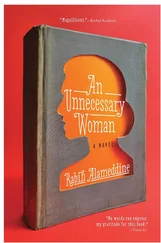I propped myself on my elbow to watch her more easily. Usually when I moved around in bed, she would tell me to keep still so I could fall asleep faster, but not tonight, probably because of the holiday.
“But what if God didn’t stop him? Would he have killed his son?”
“Is that what’s worrying you?” Finally done, she walked to her side of the bed. She looked quite different without makeup, more girlish. “It’s just a story, Osama. It’s not real.” She slowly got into bed. “Stories are for entertainment only. They never mean anything.”
“Grandfather said it happened on a mountain and God stopped Abraham’s hand just as he was about to cut Ishmael’s throat. He was on a mountain that was close to the sky, and it was a clear day, too, so God was able to see everything.”
“Your grandfather says many things that aren’t true. You know how wild his stories are. You know he never went to school or anything like that. It’s not his fault. But you don’t have to believe the same things he does. If you think something he’s saying is too foolish to be true, then it is.” She stretched, clicked off the light switch on the wall. “Don’t let his stories trouble you. Don’t let any story trouble you.” She turned me around and hugged me. We were together like quotation marks. “Now go to sleep.”
“I don’t like Abraham’s story,” I said to the dark. “It’s not a good one.”
After a slight pause, “I don’t like it, either.”
I thought about the story. “If God asked you, would you kill me?” I felt her shudder.
“Now you’re being silly,” she said. “Of course I wouldn’t do such a thing. Go to sleep and stop thinking.”
“But what if God asked you to?”
“He won’t ask me.”
“What if he asked Dad to kill me? Would he do it?”
“No. Now, don’t be annoying.”
I could not stop thinking. “What if God told someone to kill another person — would that be okay? You couldn’t put the killer in jail if God told him to do it. What if God told someone to kill a lot of people? Like how about the Turks or the French? God tells a man to kill all the French, and he goes out and shoots every Frenchman he sees. Bang, bang, bang. Is that okay? Does he get blamed? What if—”
She shushed me. She covered my mouth with her left hand. I could smell verbena, her moisturizing lotion. “God doesn’t talk to people,” she whispered in my ear. “God doesn’t tell anybody to do anything. God doesn’t do anything.”
“But people believe God talks to them.”
“Stupid people, only stupid people.”
I heard a mosquito’s buzz. I sat up, announced its presence to the room.
“Damn,” she said. “I thought the room was sprayed.” She stood up, considered ringing the buzzer for the maid, then opened the nightstand drawer and removed one Katol. Without turning on the light, she pushed the green spiral insecticide into its stand, struck a match to it. In the sudden flare, she looked like a movie star, her dark hair falling around her face.
“You don’t believe in God, do you, Mother?” I asked.
She looked at me as if I were a stranger, then blew out the match, throwing her face into darkness. “No,” she said, “I don’t believe there is a God.” I heard the hollow sound of the match falling in the waste-basket. “But I don’t want you talking about this with other people. It’s not something we talk about. Do you understand?”
“But how do you know there’s no God?”
“Because, if there’s a God, your father would have been smitten already. Now, for the last time, go to sleep or go to your room.”
The odor of the mosquito killer, mixed with verbena, permeated the room.
That night, in the comfortably furnished parlor while everyone else slept, the doctor confessed everything to his wife. His back to the mild fire, he knelt before her, wept. She put down her knitting and listened to his elaborate explanations. He was weak, only human. He didn’t know what had possessed him. It wasn’t Lucine’s fault. It was his. If only he could castrate himself, his life would be so much simpler, he would be a better human being, the husband she deserved. She remained quiet. It would never happen again, he promised her. It was an accident. Inconsequential. He would once again prove worthy of her trust. She was his anchor. She was his faith. Would she forgive him?
“What about her ankle?” his wife asked.
Puzzled, the doctor could think of nothing to say.
“Is her ankle all right?” she asked.
“It’s a severe sprain,” he responded. “It’ll be back to normal in a month or so, but she needs to be off it for three or four days.”
His wife went back to her knitting. Looking down at her work, she said, “That’s going to be difficult. It’s hard to keep that girl off her feet. She’s so industrious and loyal. I don’t know if she’ll be able to stay still for three days.”
Her husband walked back to his chair. He took out his pipe and his tobacco pouch. He began his nightly ritual. “We’ll just have to force her.” He lit the pipe, took a few puffs, waited for the shreds of tobacco to turn amber before blowing out the match. “For her own good.”
“You’re right. I’ll have to find her some chores that don’t require her to move about.”
He opened his book, and the bookmark fell on his lap. “Just make sure her leg is elevated.”
“Yes. The sprained ankle always above her heart, to make sure it doesn’t swell too much.” She paused, smiled at him; then her fingers resumed their spidery work.
A cast-iron woodstove dominated my grandfather’s sitting room. The exhaust pipe, big enough for a soccer ball to roll through, extended all the way across the room to the ceiling on the other side. He removed the stove every spring, yet when he brought it back in late autumn he placed it in the exact same spot, across the room from the hole in the ceiling. He stuffed the stove with split oak, pine, and pinecones throughout the cold season. The sitting room always felt like a slow-burning oven. And whenever the capricious wind changed direction, aggressive smoke puffed back into the room, searing my lungs. If I complained, my grandfather chided me for not liking the scent of burnt pine, for being a spoiled city boy used to gardenias and lavender handpicked from the gardens.
In winter, the stove became the center of his universe. He cooked on it, brewed his maté, his tea, his coffee. He moved his bed next to it. He left his sitting room only to go to the bathroom at the back of the house.
The next day, Lucine’s ankle was swollen and her leg blue to the knee. The doctor’s wife brought her a pink oleander and placed it in a chipped glass beside her bed. She raised the bottom end of the bed on bricks. She cleaned Lucine’s bedpan. Lucine mumbled incoherent apologies, too shy to speak directly to her madame.
Two weeks later, the doctor stood next to his wife in the doorway of the maids’ room, watching Zovik, the second maid, help Lucine vomit into a rusty metal pail.
“Make sure the ankle doesn’t move,” the doctor instructed Zovik.
“This is the will of God,” his wife whispered to him.
Lucine’s ankle remained swollen for the rest of her life, all thirteen months of it.
“Play me something,” my grandfather said. He slumped on his small couch, the cigarette between his fingers a nub, totally forgotten.
“But you don’t like what I play,” I said.
My grandfather heaved a sigh of impatience. The cigarette burned his finger. He dropped it on the couch. He stared at his hand, astonished. He stamped the cigarette with the palm of his hand. The butt bounced off the cushion, hit the floor already extinguished. “Pfflt. I never said I don’t like what you play.” He raked his curly white hair with both hands, but it remained as unruly as it always was, as unruly as he was. “You’re my flesh and blood.” His beard was scraggly but clean. His clothes were unruly as well.
Читать дальше












